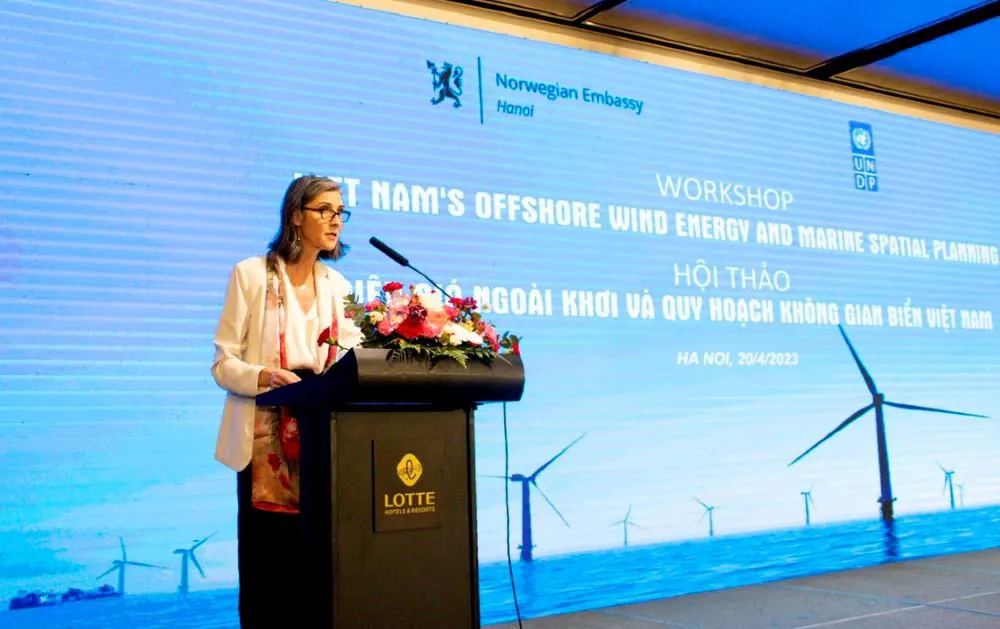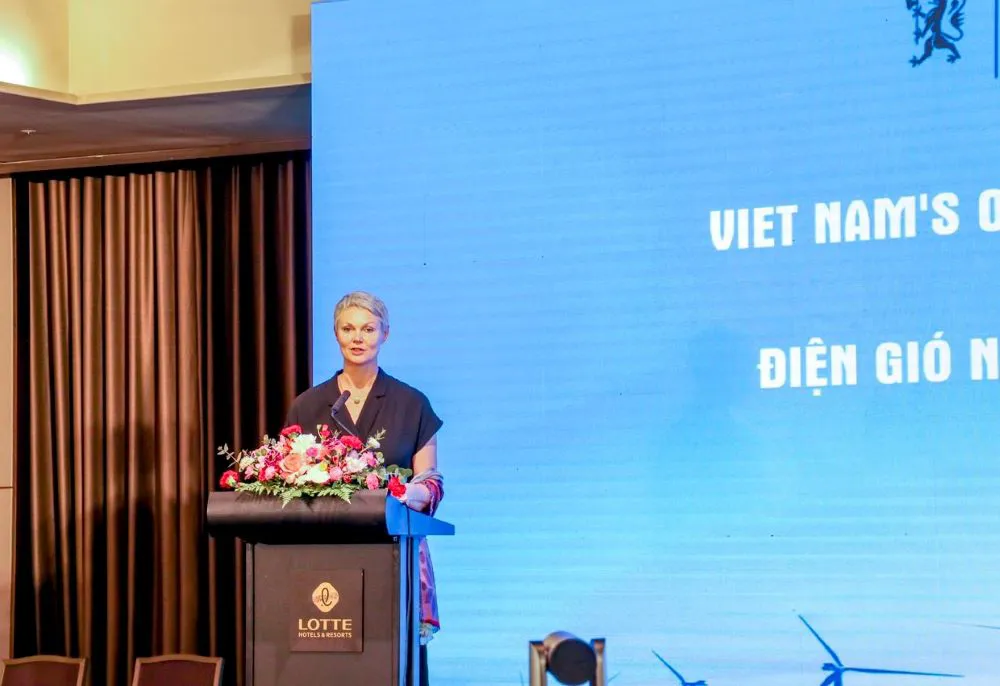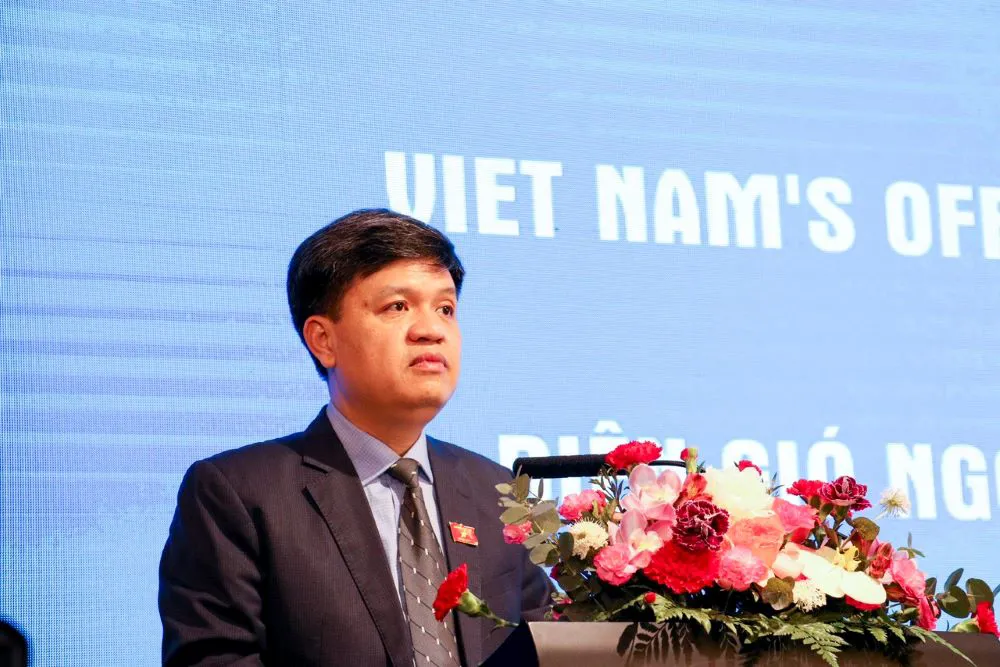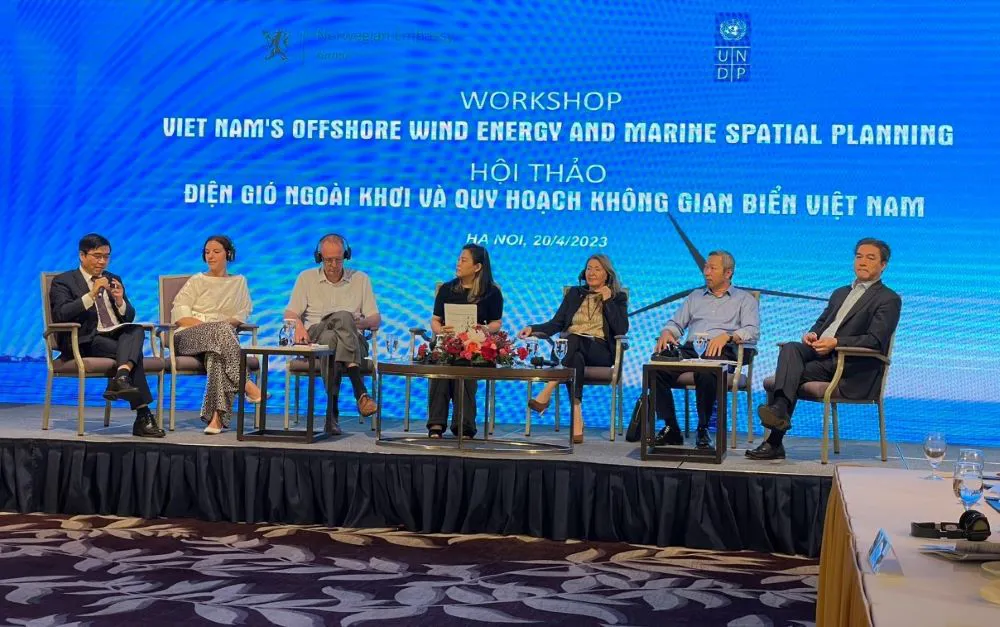Sustainable marine spatial planning matters to unlocking offshore wind potential
Vietnam is at a relatively early stage in the process of formulating both its coastal zone planning and sustainable management of resources document and its maritime spatial planning document.
Marine spatial planning is essential for unlocking the tremendous potential of offshore wind power for Vietnam, contributing to the achievement of the Sustainable Development Goals (SDGs) and net zero emissions set for 2050.
| Ramla Khalidi, UNDP Resident Representative in Vietnam, speaks at the workshop held in Hanoi on April 20. Photos: UNDP Vietnam |
Ramla Khalidi, UNDP Resident Representative in Vietnam, shared the view at a workshop today [April 20] sharing international experiences and next steps for marine spatial planning (MSP) and discussing offshore wind power development in Vietnam.
Experts from Norway and UK, among others, shared valuable insights and recommendations on sustainable ocean planning, zoning, offshore wind energy, and assessment of and qualification criteria for sea areas for offshore wind.
“Marine spatial planning should be seen as a continuous process rather than a single fixed product. As such, we must not seek to develop a single, perfect and all-encompassing document at this stage,” Ramla Khalidi said at the workshop highlighting the crucial role of MSP.
“It is essential that the development and approval of the Marine Spatial Plan, as well as the definition of the sites for offshore wind power development, is done in an open, consultative and inclusive process,” Ramla Khalidi said, noting the engagement of all stakeholders, especially local communities in ensuring equitable sharing of benefits and the protection of vulnerable groups.
| Hilde Solbakken, Norwegian Ambassador to Vietnam, addresses the event. |
Sharing the same idea, Hilde Solbakken, Norwegian Ambassador to Vietnam, said: “An effective approach to oceans management is and has been a very helpful tool to Norway. We believe a marine spatial plan would ensure sustainable ocean management, which is essential for achieving our shared vision of a green, resilient, and prosperous future.”
Norway, as a long-standing partner of Vietnam, is committed to combating climate change and developing sustainable ocean economy, promoting sustainable blue growth, protecting the marine environment, and supporting the country’s energy transition. In addition, as a leading ocean nation with prominent marine industries, Norway sees that emerging industries like offshore wind power have a vital role to play.
Hilde Solbakken emphasized that “by sharing and learning from each other we can ensure all industries would benefit from the ocean while marine ecosystems and biological diversity are preserved.”
| Dr. Ta Dinh Thi, Deputy Chair of the National Assembly’s Committee on Science, Technology and Environment, at the workshop. |
According to Dr. Ta Dinh Thi, Deputy Chair of the National Assembly’s Committee on Science, Technology and Environment, offshore wind power is identified as one of the breakthrough solutions for energy transformation and national energy security. It is also closely related to marine spatial planning, especially for identifying potential marine areas and suitable zoning for offshore wind power development.
“Developing renewable energy is a major policy for the Party, the National Assembly, and the Government of Vietnam,” he noted.
Role of maritime spatial planning
MSP, which will identify feasible sites for offshore wind energy projects, in the growth of the blue economy by catalyzing innovative technologies, responding to climate change impacts and fostering the energy transition.
In attendance were key stakeholders in MSP in Vietnam, including the National Assembly's Committee on Science, Technology and Environment, the Ministry of Natural Resources and Environment’s Vietnam Administration of Seas and Islands (VASI), the Electricity and Renewable Energy Authority, Petro Vietnam, GIZ, the World Bank and the Norway-based energy company Equinor, along with representatives from embassies and international organizations, local authorities, and the private sector.
| Experts at the workshop. |
At the workshop, Dr. Nguyen Minh Son at the Vietnam Academy of Science and Technology, marine expert and member of the MSP formulation team addressed the role of ocean zoning in the national MSP. Morten Dillner, Regional Head of Regulatory, Policy and Market, Equinor (Norway) highlighted key elements in offshore wind framework, international experience and area needed for a wind farm. Meanwhile, Martin Goff, Head of Environment & Permitting Offshore Wind, Equinor represented Equinor's experience in zonal and phased offshore wind development.
By providing a framework for decision-making and stakeholder engagement, MSP is expected to further ensure that renewable energy, and especially offshore wind power, is developed in a way that is socially and environmentally sustainable, while also contributing to Vietnam’s rising energy needs.
The flagship publication "Blue Economy Scenarios for Vietnam," a comprehensive report released by UNDP and VASI in May 2022, examines the potential behind sustainably developing Vietnam’s marine economy. It concluded that if a blue scenario is applied, it is estimated that the GDP of Vietnam’s marine economic sectors will be 34% (or 23.5 billion USD) higher; and GNI per capita in these sectors almost 78% (or US$7,100) higher compared to the business-as-usual scenario in 2030.






![[Net-zero strategy] Vietnam might extend current wind power feed-in tariff](https://cdn-media.hanoitimes.vn/2021/11/12/WIND_POWER_TRUNGNAM.jpg?w=480&h=320&q=100)








